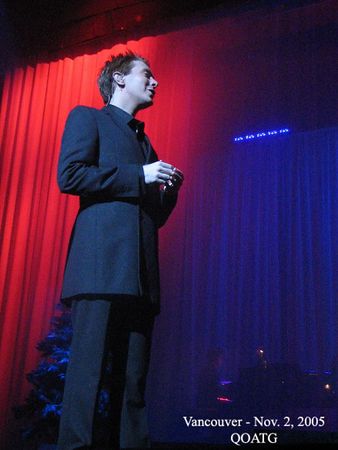Quote:
It's been very interesting, after being gone from the boards
for so long, to return to read the posts regarding Joyful
Noise 2005. I know that there is a good chance that there
will be a lot of contention after I make my comments, but
Clay suggested that I go for it, so I will.
By working
with Clay throughout his writing, directing, and rehearsing
process, I have had a great opportunity to watch the evolution
of this show, and understand the motivation of the concept
and story arch that Clay has created. Please understand
that these "notes" I give are not intended to
tell anyone how to view the show. We all know that Clay
would want each person to interpret it their own way. However,
there are a few things that I have noticed while reading
the posts on here that I feel might benefit from some clarification
and insight into the true storyline of the show.
(1) There
seems to be an interpretation, from what I have read, that
Clay acts as the "director" of the show. In fact,
this is not the intention. In truth, Clay, Angela, Jacob,
and Quiana all play the role of "guardian angel"
type characters who look after Beverly. Clay is a "lead
angel" of sorts, and as you see him in the "flashback"
scenes where Beverly is younger and she is meeting her husband
for the first time, he has been with Beverly for her entire
life. He was there in the dance hall and placed the ornament
on the tree for her husband to give to her. He was there
in the room when she and her son made cookies together when
he was a child. He was there when she made cookies with
Tommy. It's his character's work that allows Beverly to
see that Christmas should be celebrated even without family
present. In a sense, his character brings Tommy to Beverly's
doorstep.
(2) This
show IS Clay's personality. As someone who has been fortunate
enough to have had the opportunity to get to know Clay,
I honestly can say that his personality shows through the
words and acts of the characters more so perhaps than any
other way we have seen. For me it was a tough thing to get
used to, as well. As the rehearsal process progressed, I
thought myself that this show may be lacking the "banter"
and conversational style that we have all grown so accustomed
to with Clay. I mentioned this to him, and he was very adamant
that he wanted this show to be different. He knew that it
would be a change, but he really wanted to try to express
himself in a different way. It was, and still is, very important
to him that his message, his script, and the storyline that
he worked so hard on be heard through the characters on
stage. It's a change. But it's what he wanted.
I know
that for the most part, I am writing this to people who
do grasp the concepts I talked about above. I'm sure many
of you caught on and interpreted these elements in the way
that they were intended by Clay. However, many comments
that I have read are to the contrary, and Clay tells me
that this message board is the best way to get the word
out.
I think
that it's important that we allow Clay to grow and develop
as an artist. I know that it would concern him if he thought
that people were not pleased by the show that he has worked
so hard on. (And trust me, he worked harder on this show
than he has on almost anything else.) But he would also
be disheartened to think that his fans, who are of the utmost
importance to him, have come to expect so much of him that
they are unwilling to allow him to try something new.
I'll prepare
for the imminent backlash, but...On his behalf, I encourage
you to watch this show for what it is. Not a simple concert,
but a full WORK.
Pay close attention to the characters. Pay close attention
to the dancers. Pay close attention to the "backflashes"
(shown in red lighting). They say so much about both Clay,
and the story he wants to tell you.
This show
is an entire piece of art that Clay has crafted for you,
that can't be enjoyed in pieces, but must truly be enjoyed
as a whole in order to be appreciated.
Jaymes
Foster
|



